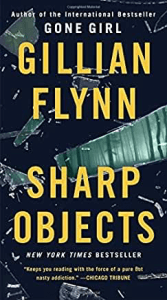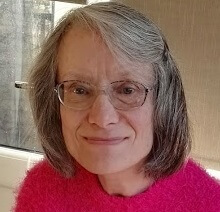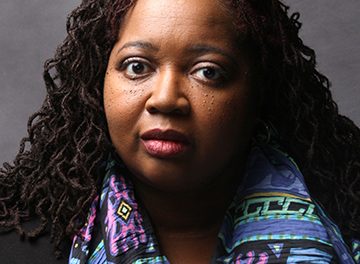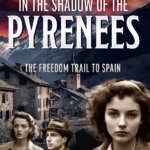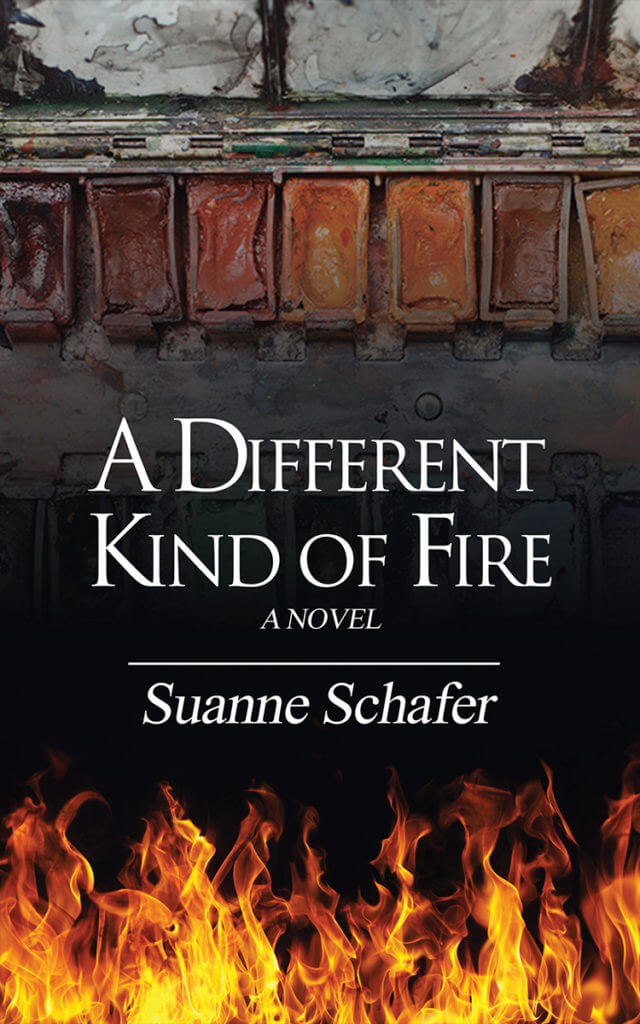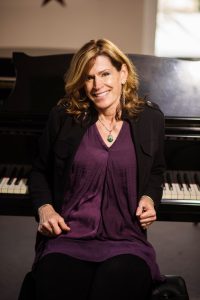
TSP: Hi Suanne, first, thanks so much for this opportunity! You are officially, my first interviewer! So I’m really excited to be here.
The short answer to your question is, no. I didn’t always want to be a writer. But the long answer is, yes. I have always written and can’t remember not keeping a journal. I went to college at Berklee College of Music in Boston and should have read the clues given to me there. In an Arranging class my first year, the teacher instructed us to write a paper about our favorite song. It was “Elevator Man” by Oingo Boingo, by the way, Danny Elfman’s first band for you fans out there. We were to describe the instruments used and talk about the form of the song among other things. The teacher gave me an A++ and asked if he could use it to illustrate to future classes how to write a paper. Of course I said, “Yes.”
For many years after that I wrote song lyrics. Nothing but a few private recordings ever came of it though. In the meantime, I blogged—nothing anyone would want to read. And dreamed of a time when I could be alone and write stories that were tumbling around in my head. When Fifty Shades of Grey went viral, I read all three books (please don’t laugh …) I was so disappointed in the writing that I decided, well, I knew I could write a better story. And that’s what I set out to do.
SS: Do you have a day job? If so, is it a distraction, or does it add another element to your writing?
TSP: My day job, which is actually a night job, is teaching piano lessons. Until this fall, I had been teaching up to 40 students a week. I recently cut way back because of the launch of my debut, Best Kept Secrets. I teach out of my home, and in fifteen years, I have developed quite a loyal base of client families. It’s a small business, really. I do the bookkeeping and scheduling. I make each student’s lesson plan and schedule and host three recitals every year.
With so many students, it’s been a full time job. But since I teach only in the afternoon and evening—after school lets out—my mornings are free. So I wake up every day at 6AM to write. The cool thing is that I get every morning to myself. Teaching isn’t a distraction at all. My schedule is perfect. I get the afternoons to switch gears, to cool down and play with the kids, so to speak.
SS: How does your home and its environment influence your writing? To what extent?
TSP: We are lucky to live in a pretty big, bilevel house. My children are both grown and flown the coup, so now it’s just my husband and our two dogs. In the basement living room, I have my corner desk where I keep my computer and all my writing books, bookshelves and inspiration. That’s where I write every morning. The main living areas of the house are upstairs—the kitchen, family room and three-season porch. My piano studio is in the family room on the second story. So I’m able to keep the two work environments separate.
SS: What is your relationship to your fictional characters? How autobiographical do you think your fiction is?
TSP: I love my characters! But I suppose, every writer does. In a way, they are more than just close friends, though. When I get involved in their lives, my characters become an extension of myself. I like to think of it as method acting because I believe you have to know those characters that well—well enough to be in their skin, no matter how uncomfortable they feel.
As far as autobiographical, there are some elements that I wrote into Best Kept Secrets that I was trying to come to terms with personally. At the time when I began that manuscript, my only sibling, my brother and I had been estranged for almost ten years. Caryn Klein and her brother Ekhard are also estranged. I think I was trying to deal with my feelings about that when I wrote her. Obviously, if you’ve read the book, Caryn and Ekhard have gone through some trying times together. They dealt with their situation in ways that I never would. My life growing up was nothing like theirs. And since my mom passed away last year, my brother and I are on speaking terms again.
SS: Do you hide any secrets in your books that only a few people will find?
TSP: No, but I love that idea! I think I’ll try that in the next book I’m writing.
SS: Do you think that self-revelation is part of the writing process?
TSP: Self-revelation is always part of the process. For me anyway. Years ago, my mom got me involved in some self-help classes that she too was taking. It was the beginning of the New Age movement, and we lived in Boulder Colorado, kind of the hub of that new age thinking. My mom had a small bookstore where she sold books by authors like Tony Robbins and the Dalai Lama. It became a big part of my life too. I even did Tony Robbins’ Firewalk.
I was college age, 19 or 20 and also very impressionable. But I was very angry about my upbringing, like many young adults. Dealing with that anger has released me to live life in a much more peaceful way. These teachings made a life-long impression on me. So I think because what I learned there, I’m always trying to better myself. I’m always looking for the underlying meaning to behaviors—especially my own. So the answer is yes.
SS: What’s the first book you read that made you think, “I’ve got to write something like this someday!”
TSP: Gillian Flynn’s Sharp Objects was that for me. Her characters were so interesting and flawed in ways I’d never seen before. And the twist at the end creeped me out for days! I hope to deliver that kind of ending someday.
SS: Can you share with us a bit about the moment when the idea for your novel first popped into your head? Did the idea come to you all at once, or did different pieces of the story come to you over time?
TSP: I was attending my first Writer’s Police Academy in 2015. If you don’t know about that conference, it’s hosted by Sisters In Crime and it’s an excellent place to learn about police procedure and criminal behavior. I attended WPA three years in a row. In 2015, I was sitting in Katherine Ramsland’s class about kids who kill—sociopaths—and taking copious notes. I believe she was talking about Justina Morley. Justina Morley was fifteen when she coerced three boys a little older than herself to kill another kid. They bludgeoned him to death with rocks and a hammer. The three boys were charged as adults and convicted of murder. They got life sentences for the cruelty and inhumanity of the crime. Justine Morley pleaded guilty to third-degree murder and was sentenced to 17-35 years in prison, but only because she gave state’s evidence against the boys.
By the time this goes out, I should have a post about Justine on my website, www.traceysphillips.com. In case anyone wants to read about her.
The idea that a child could commit such a heinous crime tickled my writer’s brain. Shortly after WPA ‘15, I began writing Best Kept Secrets. For me, the killers came to mind first. As I said earlier, I was dealing with my own feelings about an estranged brother. So the idea evolved that my sibling characters were very close growing up. Then something terrible happens that causes one to flee from the other. I can’t go into too much detail without giving away the ending but suffice it to say that their relationship is everything to them when they are young.
I believe that our memories shape us and mold us. That idea of memories was something I needed to explore in this book as well. The strong ones stay with us forever. And some cause us to make big decisions in our lives. In Best Kept Secrets, this is true for Caryn Klein and for Detective Morgan Jewell.
SS: Was the decision of how to structure the novel obvious? How did you make the decision regarding point(s) of view?
TSP: Suanne, I decided to combine these questions in one answer because they are interrelated for Best Kept Secrets. The structure of the novel wasn’t obvious to me at first. All I knew was that I needed to tell Caryn’s story. Following the hero’s journey guidelines as written by Vogler, I set out to write her story. It wasn’t until I had completed a terrible first draft that I knew this was no good. I needed another character, a good character that readers could love and connect with, to counter Caryn’s badness because I wasn’t writing a fictional memoir. I wanted this to be a psychological thriller. So the idea of dual POV’s came of necessity from the original idea. Along with that, both characters had their pasts to deal with. And I needed Morgan’s journey to be just as strong and even as uncomfortable, as Caryn’s.
SS: How long have you considered yourself a writer? Did you have any formal training, or is it something you learned as you went?
TSP: I do not have formal training. I learned through the school of hard knocks more than anything. Once I finished my first manuscript, I believed I had written the next big New York Times Best Seller. I had that ignorance and gravitas that comes with being a newbie to go out and sell my manuscript. Once I realized that it wasn’t going to make it anywhere, I revised and revised. I took classes and went to local conferences. In that way I schooled myself. And I wrote and wrote thousands of words a day.
So, for many years I didn’t consider myself a writer. It wasn’t until I’d written four manuscripts that I dared call myself that!
SS: The mystery genre is now no longer limited to the traditional detective story but embraces the police procedural, the hard-boiled novel, the tale of psychological suspense, the crime novel, and the thriller. With such enormous overlapping of these sub-genres, did you find it difficult to categorize your book?
TSP: Best Kept Secrets was difficult to pitch because of that very fact. Since I have a detective as the main character, agents wanted the book to be a traditional detective mystery. BKS isn’t that. For one thing, there are the two points of view. For another, the ending isn’t wrapped up in a nice little bow. I began pitching it as mystery/thriller, and that’s finally what got a publishing contract with Crooked Lane Books.
SS: Is one of the points of crime fiction to suggest that we might all be capable of more than we care to admit?
TSP: I believe so. Isn’t that the biggest difference between good and evil? Right and wrong? We’ve all been angry at some point, and we may even have felt completely wronged by someone. The difference is whether we act on that anger. And whether, through forgiveness, we can empathize with the person we are angry with. And even if forgiveness isn’t an option, most of us wouldn’t want to truly harm another person. We know it’s not the way to deal with things.
My husband and I laugh that he treads lightly now because of BKS. He jokes that he doesn’t want to piss me off. He’s afraid I’ll attack him with a hammer! Of course, I’d never do that. Especially to him. We’ve been together for 35 years.
SS: Do you prefer tidy endings, or can you leave a few loose ends?
TSP: Suanne, I prefer messy endings and cliff hangers. I think readers will see that about me.
SS: Why do you think so many women write crime fiction?
TSP: A friend and I discuss this recently. My dear friend will never read my book because BKS is crime fiction and she is, frankly, quite squeamish when it comes to things like that. She posed the questions to me, “Why do I write violent, dark thrillers? And why is it so popular these days?” We decided that it could be a way of expressing our own fears and anxieties. Not just ours, but people in general and society as a whole.
There are scary things happening in the world today. Let’s not talk about the daily news here, but I think people like to read thrillers because it helps them deal with emotional trauma and anxiety. It puts their fears in a relative setting. And although it’s fiction, readers are able to live vicariously through the characters and deal with those fears in a nonthreatening way.
The same is true for writers, I believe. Women are emotional and complicated creatures. We internalize everything. I know that for me, the writing process is a way to verbalize anxiety and fear and even other emotions that I don’t often have the opportunity to express. I’m sure this is true for other writers as well. And bring your vivid imagination to play here, women often imagine the worst case scenario. And that’s what writers do too. We put those worst case scenarios on the page. We make it real so that readers can move through their own feelings—whatever they may be—and in the end, bring back a sense of calm.
********************
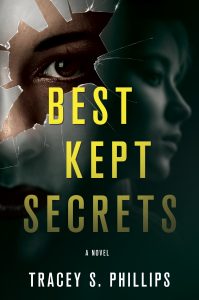
Tracey S. Phillips can be found at these social media sites:
Website | Facebook | Instagram | Twitter
********************
Excerpt from Best Kept Secrets:
Two bloodhounds, led by Indiana K9 patrol detectives, sniffed the frosty, leaf-covered ground. Parked behind a pile of dirt and upturned tree roots, a bulldozer sat like a silent, sleeping monster.
Morgan yawned, tired and regretful that she wasn’t exactly at the top of her game this morning. Rob had stayed again last night. Still sleeping, he had been in her bed when she got the call before sunup. She’d quietly dressed and given Gretta a bowl of water before Donnie picked her up.
Rob was a good bet for a steady, normal, and predictable life. He had all the best qualities: he was honest and hardworking, dependable and supportive. He was every girl’s dream guy. But it scared her that she was falling for him. Stability and security weren’t exciting. When they dated last year, Morgan had requested a “break” while Rob worked the night shift. He’d made it clear that she was right for him and told her he’d give her all the time she needed. What she really needed was time to decide if the relationship was right for her. His idea of a future together might not fit into her career dreams. Morgan didn’t see herself always working as an Indianapolis detective. But for now she liked waking up next to Rob. And she had left him a note on the kitchen table inviting him to stop by any time.
Half awake, she stumbled over rough terrain. Rocks and broken branches lay covering the uneven ground at the site, slated for development of a new strip mall. The planned urban growth should be standing here by next year, and now it was delayed. A body exhumed late yesterday lay in a scoop of earth in front of one dozer. The discovery halted all progress.
The forensic squad was in process of digging remains and rotten clothing out from the upturned earth. They placed garments and bones on a clean black tarp, attempting to reconstruct the bulldozed body as it had been before the digger scooped it up. A dirt-soaked blanket pulled from the pile lay in a heap near two faded, pinkish jelly shoes.
A weathered man wearing a camouflage hunting jacket blew smoke from his cigarette toward Donnie. “How much longer?” He scratched his shaved head with yellowed fingers that held a burning butt.
Donnie waved the cloud of smoke away from his face. “I can’t tell you exactly. These things take time.”
The construction project manager eyed Morgan up and down. His glare stopped at her breasts. “Well, look. My crew has another job next week. I can’t afford to hold off progress. The investors are breathin’ down my back to get this thing movin’ again.”
Morgan stooped to make eye contact with the man. “What you’ve uncovered here are likely the remains of a murder victim. Those remains are part of a crime scene, you understand. We can’t let you disturb anymore of the area until we’ve finished scouring it.”
The man looked back down at Morgan’s chest covered by a black leather jacket. He squinted and flicked his cigarette butt into the dirt and stepped on it. To his right, four acres had been scraped by bulldozers. Behind him, a stack of tree trunks and brush the size of a small building was ready to be chipped and hauled away. About two acres of the woods to his left remained untouched. The two teams of cadaver dogs moved between the trees.
“So, Jerry, is it? We have to remove the body and check the area for evidence,” she explained.
Donnie added, “It might take weeks. We just don’t know.”
